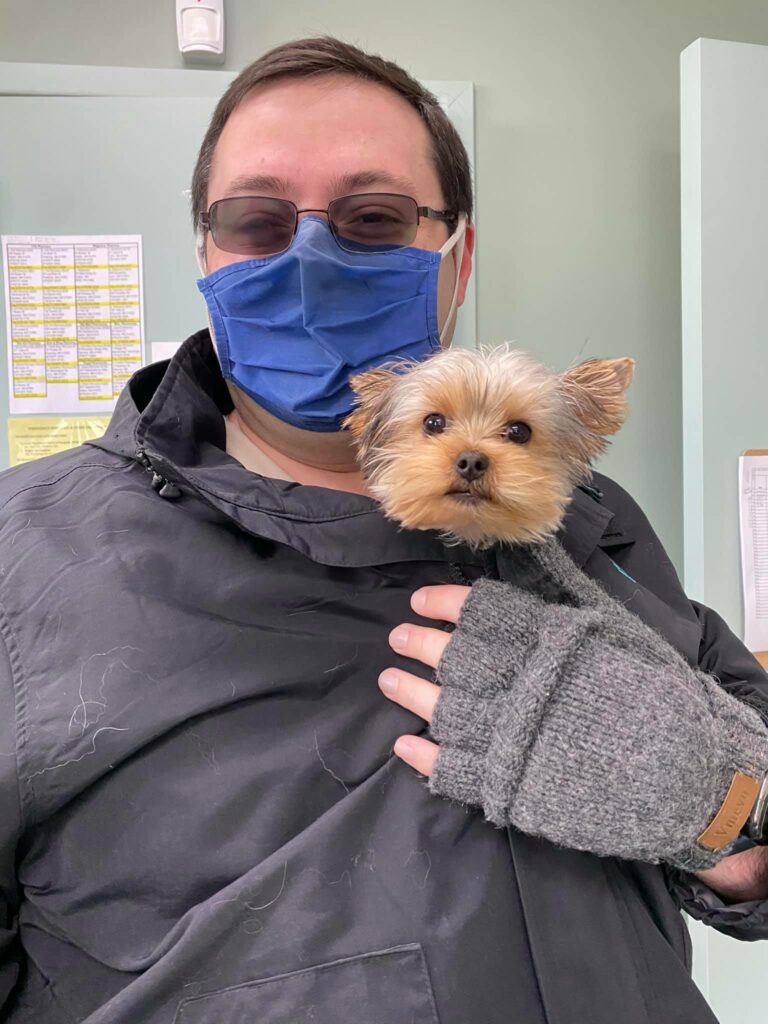What exactly does the title of “veterinary technician” mean? What do they do? Thinking about being a vet tech? Is there a difference between an assistant and a vet tech? Veterinary technicians (vet techs) are the superheroes of the veterinary world. They are a group of hard working, compassionate, organized people who keep veterinary hospitals running.
A veterinary technician is similar to a human nurse. They do a lot of the hands on part of vet medicine. Techs do the blood draws, restrain, anesthetize and monitor animals during surgery. They are the primary individuals who take care of your pet when she does stay at the hospital. Veterinarians are pretty cool, but they do a lot of the paperwork (records, phone calls, scripts, diagnosis) rather than the hands on work. Both vets and vet techs do a lot of interacting with people, but vet techs do most of the animal work.
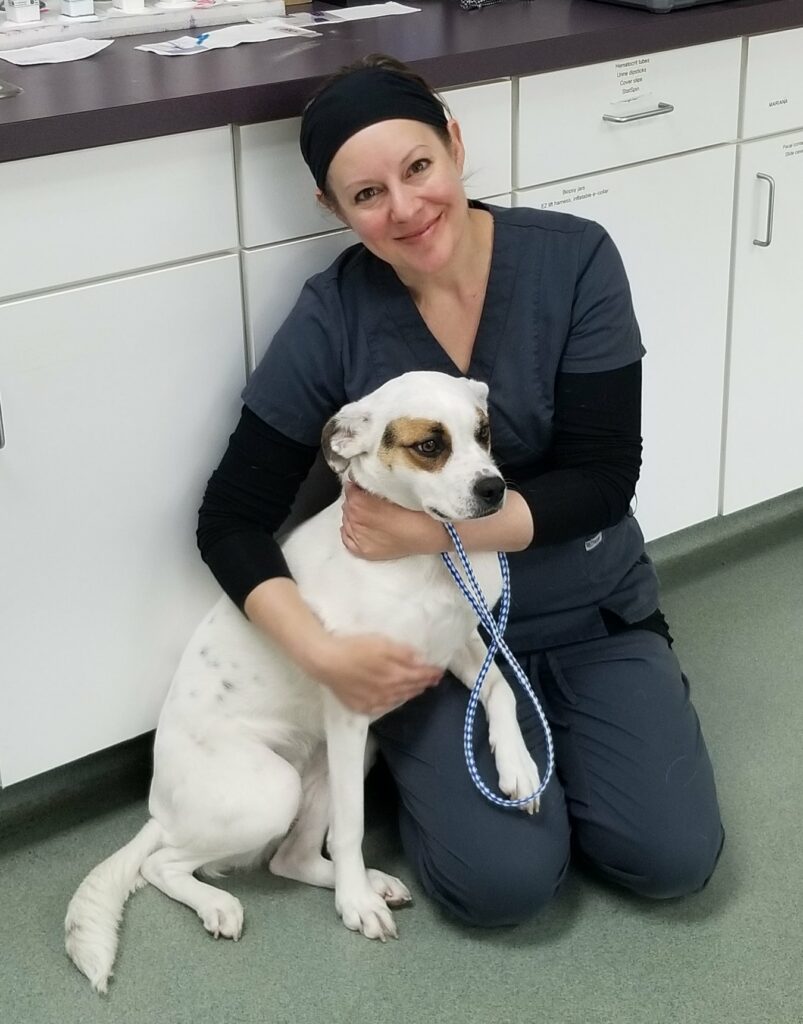
Veterinary Technician, in most states, is a licensed position– you have to have a special degree to be called a vet tech. Assistants are not licensed. Although assistants with experience may do some of the same things, what they can do varies based on state laws.
Day in the Life of a Vet Tech
Every hospital is a little different, but here at All Creatures Veterinary Hospital, our techs are very hands on! The techs start the day at 7:30 am taking care of any hospitalized and boarding patients. They also check through the phone messages and prescriptions and get the most important ones (heart medications, seizure medications) filled and ready to go. The techs also look through the schedule and fill themselves in about each patient’s story.
Appointments
Once the doors open, the techs will start putting patients and their owners into rooms. Once they make sure a room is clean and set up, they call their patients’ name and bring them into the room. After getting a weight, temperature, and very quickly assessing if the patient is critical, they will get a “history”. This means they collect information about why a patient is here in the hospital. This could just be for vaccines, but they will still ask about diet, current medications, and any concerns an owner may have. They discuss dental health, the importance of blood work, the reason for each vaccine, and prepare everything for the doctor.
After this, the step out of the room and collect all vaccines and update the record. They also set up for any testing needed for that patient. Then they update the doctor! This step usually takes a few minutes, as the doctor often asks questions and suggests additional testing. When the doctor is ready, the tech then goes back into the room, and helps restrain the patient for the doctor. Once we discuss everything with the owner, the tech will take the patient for any testing (blood work, x-rays) or treatments that need to be done. Once we are completely finished with the patient, the tech returns the pet to the owner and checks the owner out and fills any medications.
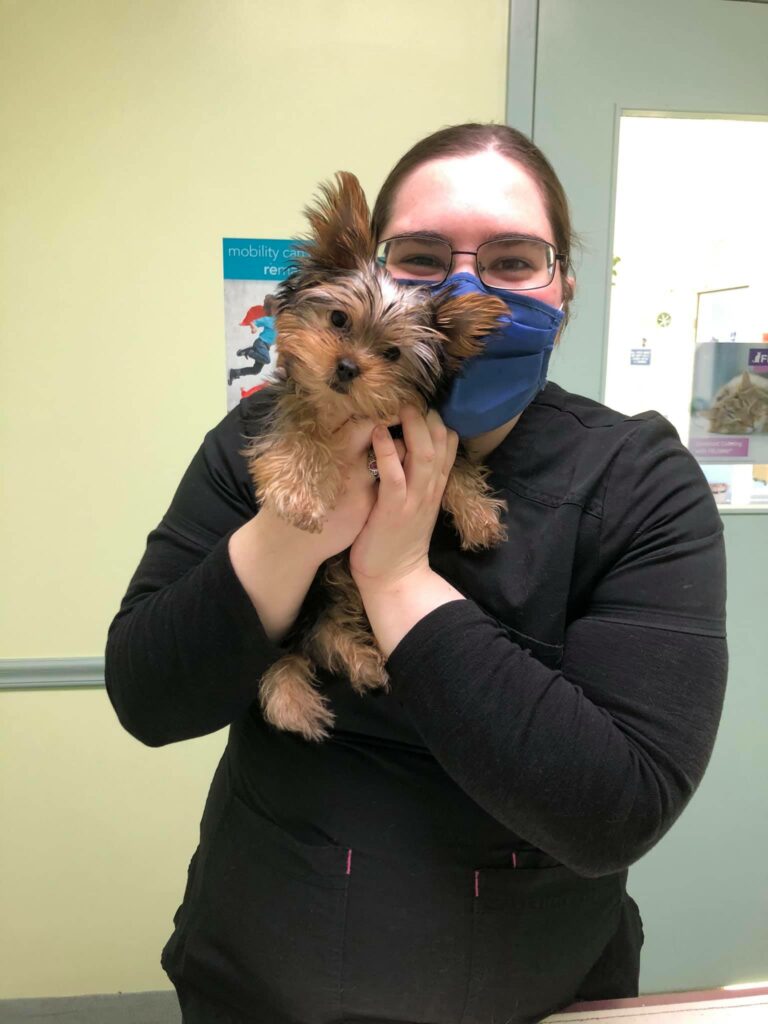
Surgery
On surgery days, vet techs will go get the patient and take a brief history. Then the tech will set up a nice kennel for her, with a blanket, and food and water if allowed. The doctor calculates the drugs for the patient, and the technician will get these ready. At the same time, the techs are getting catheters ready, getting ready to intubate, and setting up the surgery room. Then, they will give the medications to the pet to make her sleepy.
After your pet is sleepy, the technician will place an IV catheter, intubate her, and get her started on IV fluids. The tech will then shave the surgical area and get it all cleaned up for surgery. They then carry your pet into the surgery suite, and scrubbed for surgery.
During surgery, the tech will monitor blood pressure, heart rate, the ECG, temperature, and how sleepy your pet is. This is the most important job in surgery! Techs will make any adjustments necessary throughout the surgery to keep your pet comfortable and asleep.
Once surgery is over, the tech will wake up your pet slowly, and ensure she is not in any pain. Once warm and comfortable, your pet is moved to a clean kennel, which has been set up already by the techs. The technician will continue to check on your pet throughout the day until she goes home.
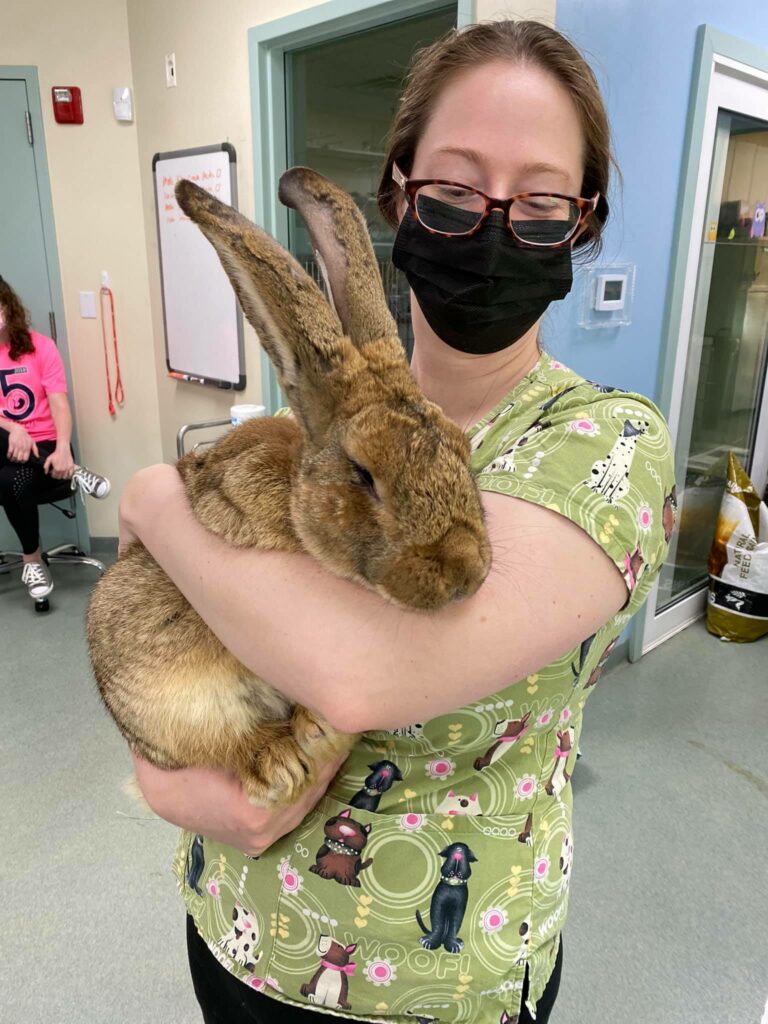
Down Time
A tech does not have any real down time. When a tech is not in surgery or an appointment, she will be cleaning rooms, walking pets, giving that boarding dog an extra pet, making up prescriptions, calling patients to check in, writing emails, and entering records. If they are lucky, they get to sit down while they do some of these things! Once the hospital is closed, they will also do a lot of the evening cleaning and set up the rooms for the next day. Generally technicians are in the hospital for 1-2 hours after closing, just to get ready for tomorrow.
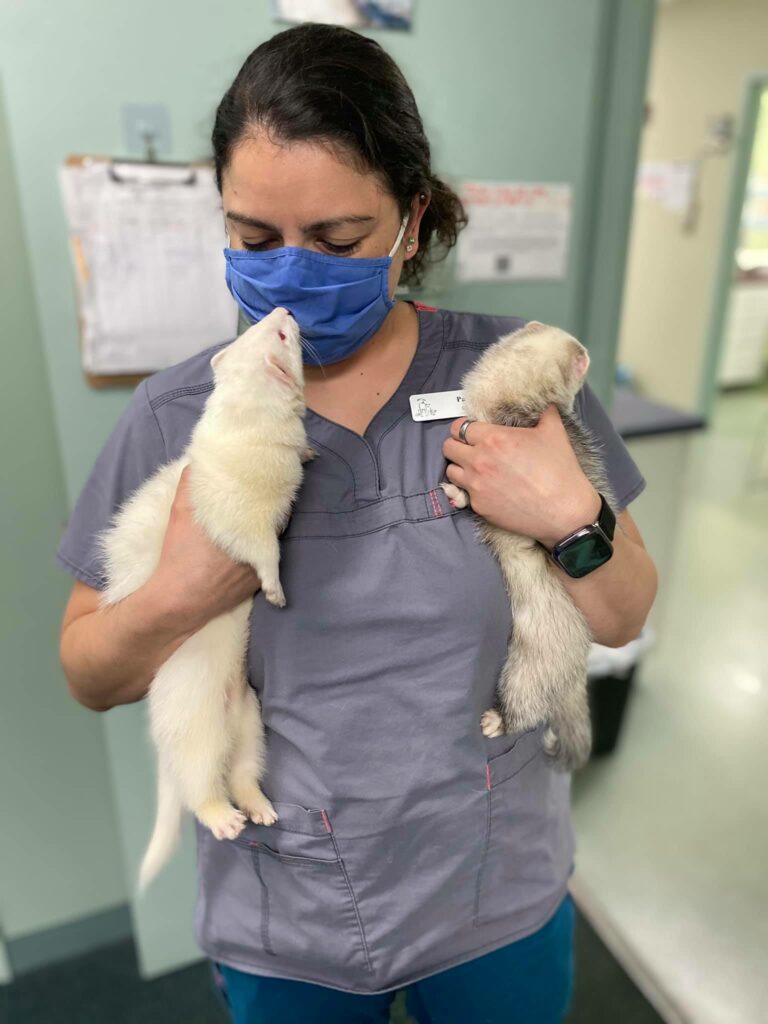
Hours and Pay
This is a tough job, and technicians do not receive enough respect. Many technicians work over 40 hours per week, and most get paid just above minimum wage. The average pay for a certified veterinary technician in Massachusetts is only $18.00 per hour. For a person who performs this job without certification, the pay is less. Depending on the certification program (more on schooling later), a technician may be in $15,000 to $25,000 of student debt on average. Many technicians do not have enough money each month to pay off their loans and put money toward retirement, so they face the possibility of not being able to retire later in life.

Certification Process- School is Cool!
As we mentioned before, in some states, you can do the job of a veterinary technician without the schooling, but many states are deciding to change this. Only certified technicians will be able to use the title, and perform certain parts of the job (again, this depends on the state at this point). Being certified is not currently necessary in Massachusetts to be a vet tech. This is only true of 10 total states in the United States.
In order to be a licensed veterinary technician, you need to complete either a two- or four-year college program that has been certified by the American Veterinary Medical Association (AVMA). After this, you have to take a comprehensive test on all species (even the ones you don’t want to see). If you pass (and some do not), then you can be certified as a veterinary technician. Most states require a certain number of Continuing Education (CE) hours per year in order to maintain this status.
If a tech really enjoys just one aspect, he or she can specialize, which requires more schooling and training.
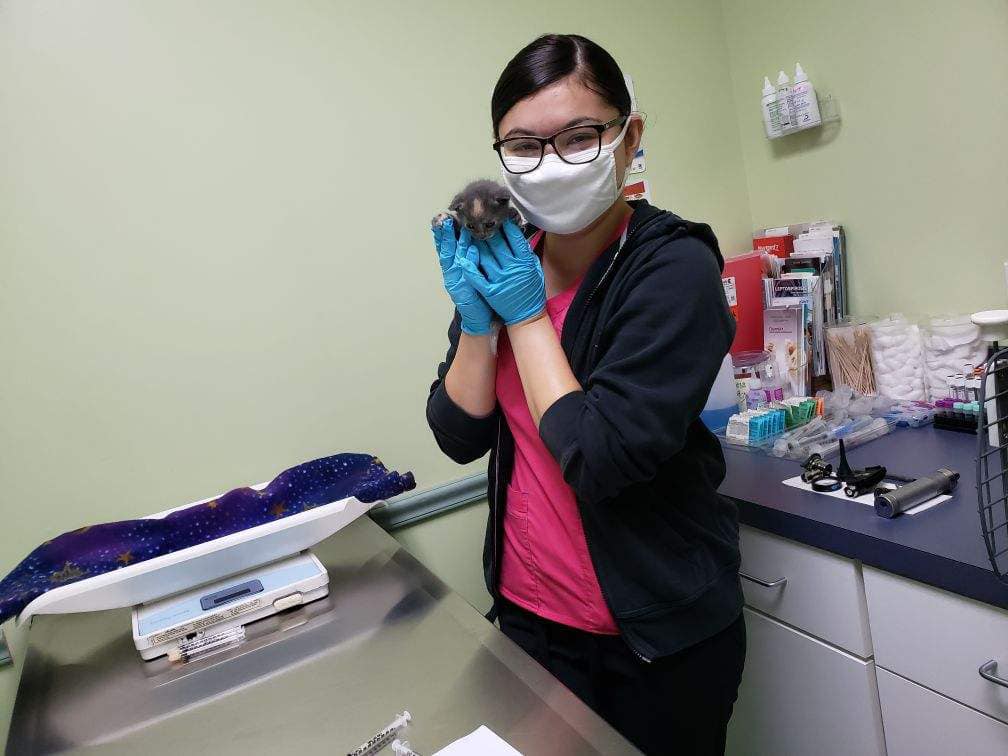
Final Verdict
Being a vet tech (or assistant) is a very rewarding job, but to call it difficult is an understatement. Techs will see puppies one minute, and hold the paw of a patient who is passing away the next. They work for hours before and after the hospital has closed, and every minute is packed. There is always more for a technician to do! Their job is physically demanding, requiring enough flexibility to get to the floor to comfort a scared patient, enough strength to bring a patient onto the table, and some creative solutions for treating patients!
Technicians are looked down upon, despite having to go through schooling, training, and annual continuing education. Often, veterinarians get the praise when something goes right, and technicians never get all the recognition they deserve. They work so hard and many cannot even to afford to buy a house or save for retirement on their salaries, and have to take on other part time jobs to make ends meet.
However, techs also get to work every day in a job where they make a huge difference. They are always learning, always moving, and always challenged. Every minute of their day is helping another living being (humans and animals!), which is not something most people can say. They are also always in demand; job security is not an issue for a vet tech.
Technicians are hands on, caring, and extremely compassionate individuals! They are the driving force behind the hospital and we love them! And to say we need them is an understatement. Next time you bring your pet to the vet, make sure to thank the technician. Technicians are superheroes, and that’s a fact. She’s the one who will make sure your pup gets a cookie and your cat gets and extra snuggle on the way out.
